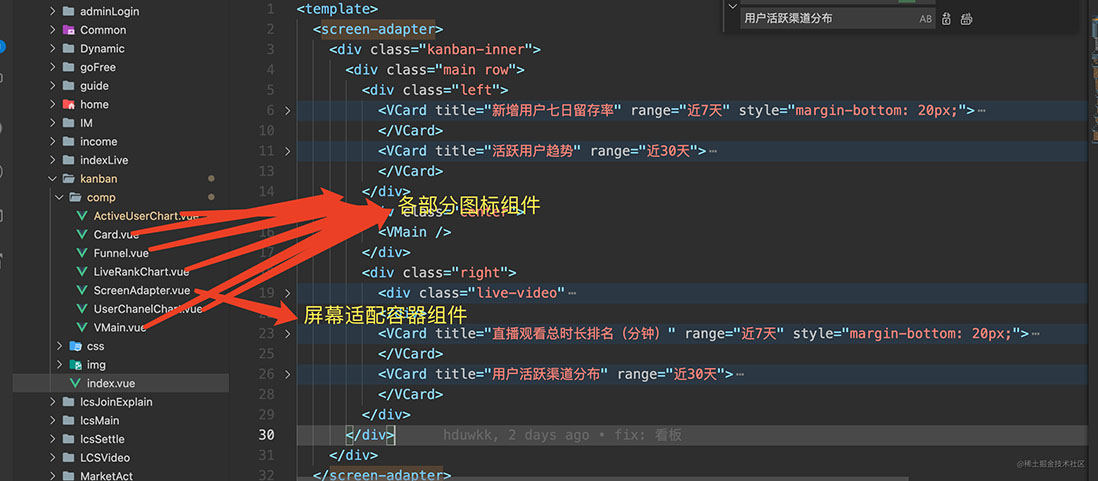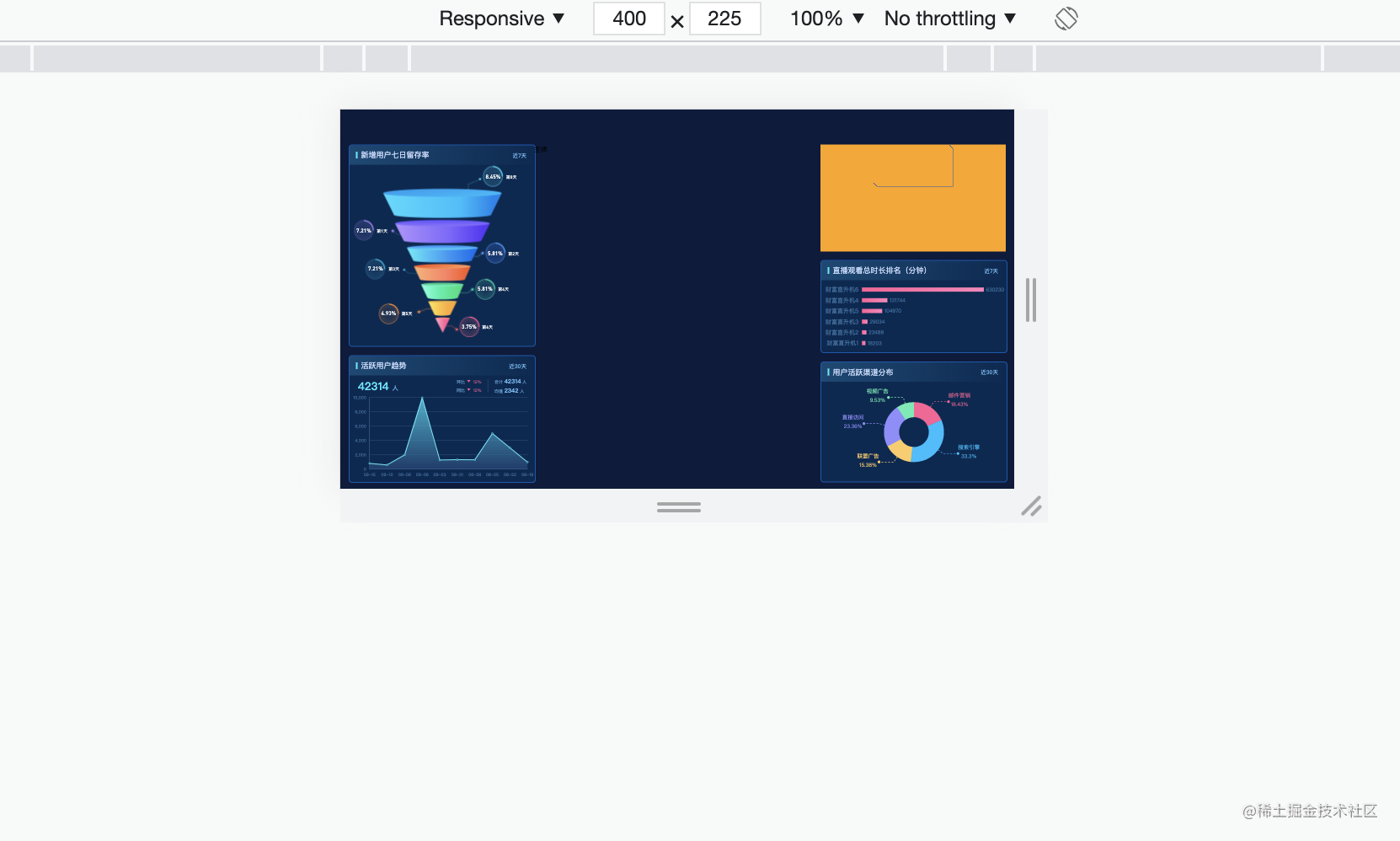жӮЁеҘҪпјҢзҷ»еҪ•еҗҺжүҚиғҪдёӢи®ўеҚ•е“ҰпјҒ
жӮЁеҘҪпјҢзҷ»еҪ•еҗҺжүҚиғҪдёӢи®ўеҚ•е“ҰпјҒ
жң¬зҜҮеҶ…е®№д»Ӣз»ҚдәҶвҖңеҰӮдҪ•е®һзҺ°EchatsеӣҫиЎЁеӨ§еұҸиҮӘйҖӮеә”вҖқзҡ„жңүе…ізҹҘиҜҶпјҢеңЁе®һйҷ…жЎҲдҫӢзҡ„ж“ҚдҪңиҝҮзЁӢдёӯпјҢдёҚе°‘дәәйғҪдјҡйҒҮеҲ°иҝҷж ·зҡ„еӣ°еўғпјҢжҺҘдёӢжқҘе°ұи®©е°Ҹзј–еёҰйўҶеӨ§е®¶еӯҰд№ дёҖдёӢеҰӮдҪ•еӨ„зҗҶиҝҷдәӣжғ…еҶөеҗ§пјҒеёҢжңӣеӨ§е®¶д»”з»Ҷйҳ…иҜ»пјҢиғҪеӨҹеӯҰжңүжүҖжҲҗпјҒ
1.еҮҶеӨҮдёҖдёӘе®№еҷЁз»„件пјҢwidth = 100vw,height = 100%,дҪңдёәеӨ§еұҸеұ•зӨәзҡ„иғҢжҷҜпјҡ
<div class="screen-adapter">
</div>
.screen-adapter {
width: 100vw;
min-height: 100%;
max-height: 100vh;
overflow: hidden;
background: #0c1a3c;
}2.ж №жҚ®и®ҫи®ЎеҗҢеӯҰжҸҗдҫӣзҡ„и®ҫи®ЎеӣҫеҸҜд»Ҙи®Ўз®—еҮәжҜҸйғЁеҲҶеҢәеҹҹзҡ„зҷҫеҲҶжҜ”пјҢдҫӢеҰӮжҖ»е°әеҜёжҳҜw*hпјҢе…¶дёӯдёҖдёӘеӣҫж Үе®Ҫй«ҳжҳҜw1 * h2пјҢе®һзҺ°еёёи§„еҲҮеӣҫпјҢжӯӨж—¶з”ұ1-->2еҸҜеҫ—пјҡ
<div class="screen-adapter">
<div class="content-wrap" :>
<slot></slot>
</div>
</div>
props: {
w: { // и®ҫи®Ўеӣҫе°әеҜёе®Ҫ
type: Number,
default: 1600
},
h: { // и®ҫи®Ўеӣҫе°әеҜёй«ҳ
type: Number,
default: 900
}
},
data () {
return {
style: {
width: this.w + 'px',
height: this.h + 'px',
transform: 'scale(1) translate(-50%, -50%)' // й»ҳи®ӨдёҚзј©ж”ҫпјҢеһӮзӣҙж°ҙе№іеұ…дёӯ
}
}
}
.content-wrap {
transform-origin: 0 0;
position: absolute;
top: 50%;
left: 50%;
}3.еҹәдәҺ第дәҢжӯҘпјҢйңҖиҰҒж №жҚ®еӨ§еұҸе…·дҪ“е°әеҜёи®Ўз®—зј©ж”ҫжҜ”дҫӢпјҢд»ҘеҸҠи®ҫзҪ®зј©ж”ҫжҜ”дҫӢпјҢйңҖиҰҒжіЁж„Ҹзҡ„жҳҜпјҢз»‘е®ҡresizeдәӢ件дёҖе®ҡеҲ«еҝҳдәҶйҳІжҠ–пјҢйЎөйқўй”ҖжҜҒеҲ«еҝҳдәҶ移йҷӨзӣ‘еҗ¬дәӢ件пјҡ
mounted () {
this.setScale()
this.onresize = this.debounce(() => this.setScale(), 100)
window.addEventListener('resize', this.onresize)
},
beforeDestroy () {
window.removeEventListener('resize', this.onresize)
},
methods: {
// йҳІжҠ–
debounce (fn, t) {
const delay = t || 500
let timer
return function () {
const args = arguments
if (timer) {
clearTimeout(timer)
}
const context = this
timer = setTimeout(() => {
timer = null
fn.apply(context, args)
}, delay)
}
},
// иҺ·еҸ–зј©ж”ҫжҜ”дҫӢ
getScale () {
const w = window.innerWidth / this.w
const h = window.innerHeight / this.h
return w < h ? w : h
},
// и®ҫзҪ®зј©ж”ҫжҜ”дҫӢ
setScale () {
this.style.transform = `scale(${this.getScale()}) translate(-50%, -50%)`
}
}4.иҮіжӯӨпјҢеӨ§жҰӮз»“жһ„е·Із»Ҹеҫ—еҲ°пјҢеҸӘйңҖиҰҒе°Ҷеҗ„йғЁеҲҶеӣҫж Ү组件иҝҳеҺҹзҡ„и®ҫи®Ўеӣҫж”ҫе…Ҙд№ӢеүҚзҡ„ жҸ’ж§ҪеҚіеҸҜпјҢеҗ„йғЁеҲҶеӣҫж Ү组件зҡ„е°әеҜёжҢүз…§и®ҫи®ЎжҸҗдҫӣзҡ„зҷҫеҲҶжҜ”еҚіеҸҜпјҢжүҖжңүд»Јз ҒеӨ§иҮҙеҰӮдёӢпјҡ
// ScreenAdapter.vue
<template>
<div class="screen-adapter">
<div class="content-wrap" :>
<slot></slot>
</div>
</div>
</template>
<script>
export default {
props: {
w: {
type: Number,
default: 1600
},
h: {
type: Number,
default: 900
}
},
data () {
return {
style: {
width: this.w + 'px',
height: this.h + 'px',
transform: 'scale(1) translate(-50%, -50%)'
}
}
},
mounted () {
this.setScale()
this.onresize = this.Debounce(() => this.setScale(), 100)
window.addEventListener('resize', this.onresize)
},
beforeDestroy () {
window.removeEventListener('resize', this.onresize)
},
methods: {
Debounce (fn, t) {
const delay = t || 500
let timer
return function () {
const args = arguments
if (timer) {
clearTimeout(timer)
}
const context = this
timer = setTimeout(() => {
timer = null
fn.apply(context, args)
}, delay)
}
},
getScale () {
const w = window.innerWidth / this.w
const h = window.innerHeight / this.h
return w < h ? w : h
},
setScale () {
this.style.transform = `scale(${this.getScale()}) translate(-50%, -50%)`
}
}
}
</script>
<style>
.screen-adapter {
width: 100%;
min-height: 100vh;
max-height: 100vh;
overflow: hidden;
background: #0c1a3c;
}
.content-wrap {
transform-origin: 0 0;
position: absolute;
top: 50%;
left: 50%;
}
</style>


еҸҜд»ҘзңӢеҮәпјҢеӯ—дҪ“еӣҫиЎЁйғҪжҳҜзӯүжҜ”дҫӢзј©ж”ҫзҡ„
вҖңеҰӮдҪ•е®һзҺ°EchatsеӣҫиЎЁеӨ§еұҸиҮӘйҖӮеә”вҖқзҡ„еҶ…е®№е°ұд»Ӣз»ҚеҲ°иҝҷйҮҢдәҶпјҢж„ҹи°ўеӨ§е®¶зҡ„йҳ…иҜ»гҖӮеҰӮжһңжғідәҶи§ЈжӣҙеӨҡиЎҢдёҡзӣёе…ізҡ„зҹҘиҜҶеҸҜд»Ҙе…іжіЁдәҝйҖҹдә‘зҪ‘з«ҷпјҢе°Ҹзј–е°ҶдёәеӨ§е®¶иҫ“еҮәжӣҙеӨҡй«ҳиҙЁйҮҸзҡ„е®һз”Ёж–Үз« пјҒ
е…ҚиҙЈеЈ°жҳҺпјҡжң¬з«ҷеҸ‘еёғзҡ„еҶ…е®№пјҲеӣҫзүҮгҖҒи§Ҷйў‘е’Ңж–Үеӯ—пјүд»ҘеҺҹеҲӣгҖҒиҪ¬иҪҪе’ҢеҲҶдә«дёәдё»пјҢж–Үз« и§ӮзӮ№дёҚд»ЈиЎЁжң¬зҪ‘з«ҷз«ӢеңәпјҢеҰӮжһңж¶үеҸҠдҫөжқғиҜ·иҒ”зі»з«ҷй•ҝйӮ®з®ұпјҡis@yisu.comиҝӣиЎҢдёҫжҠҘпјҢ并жҸҗдҫӣзӣёе…іиҜҒжҚ®пјҢдёҖз»ҸжҹҘе®һпјҢе°Ҷз«ӢеҲ»еҲ йҷӨж¶үе«ҢдҫөжқғеҶ…е®№гҖӮ